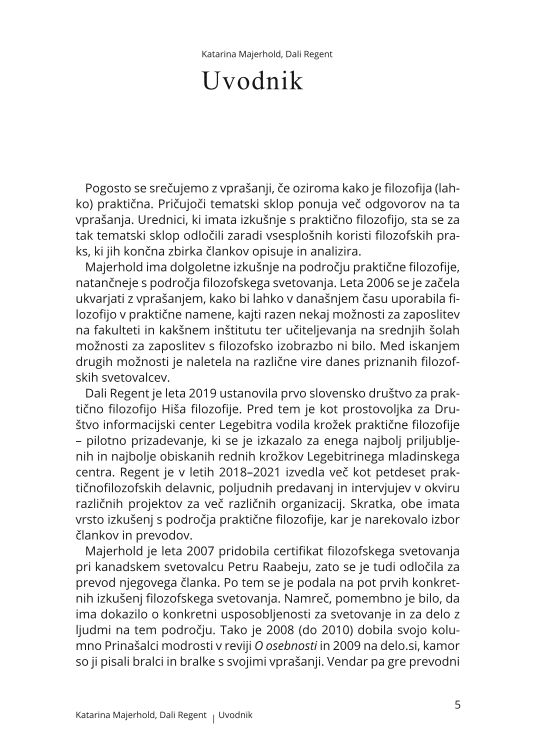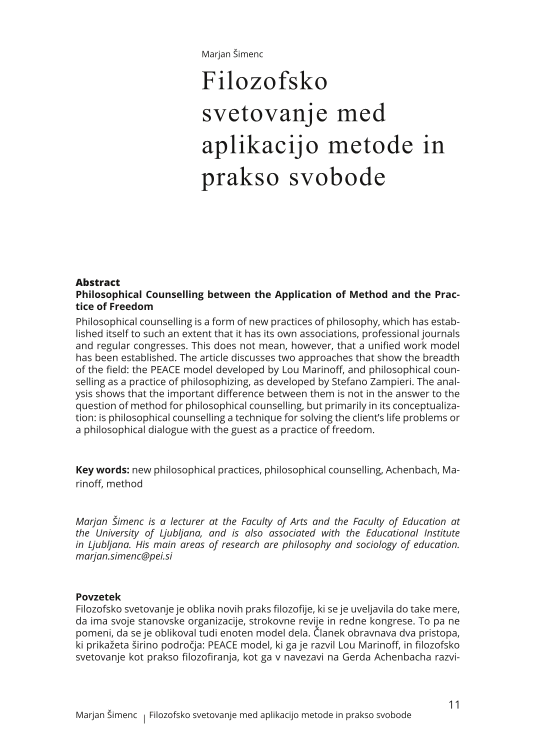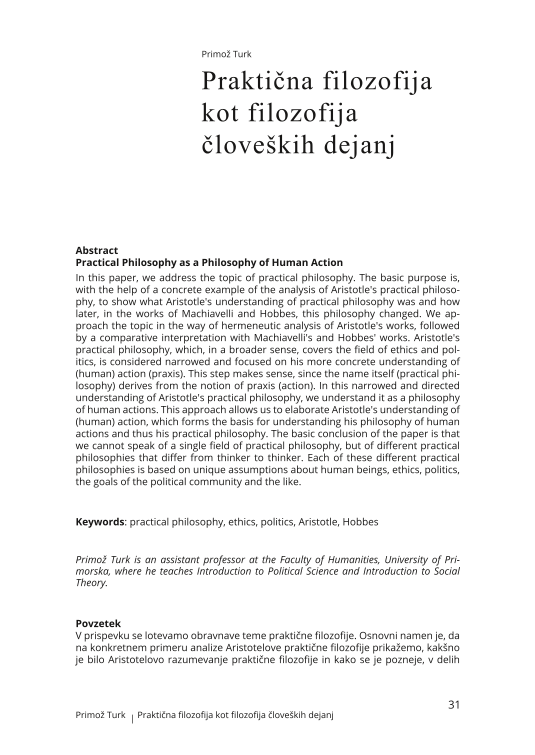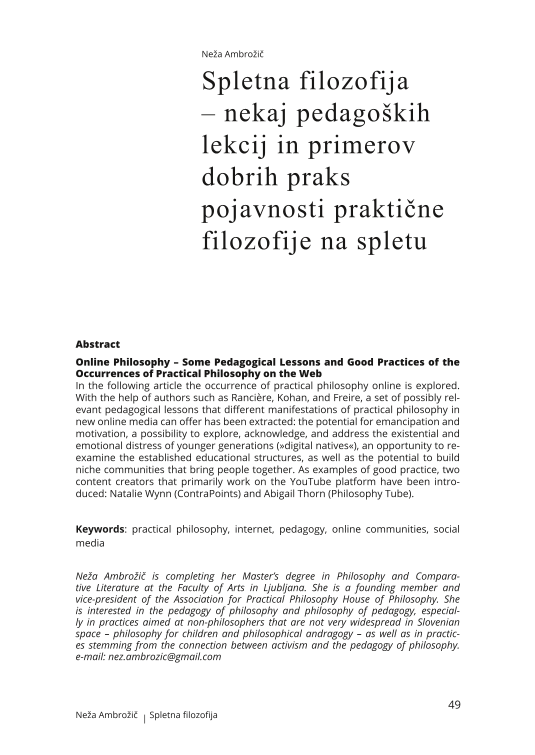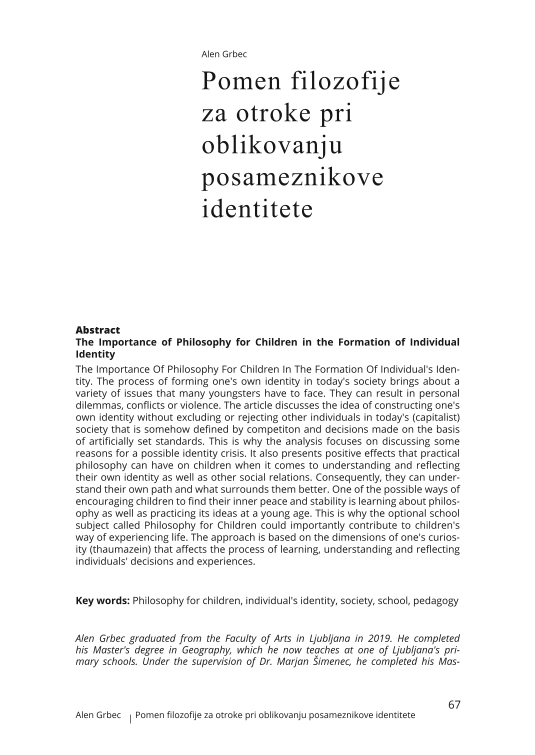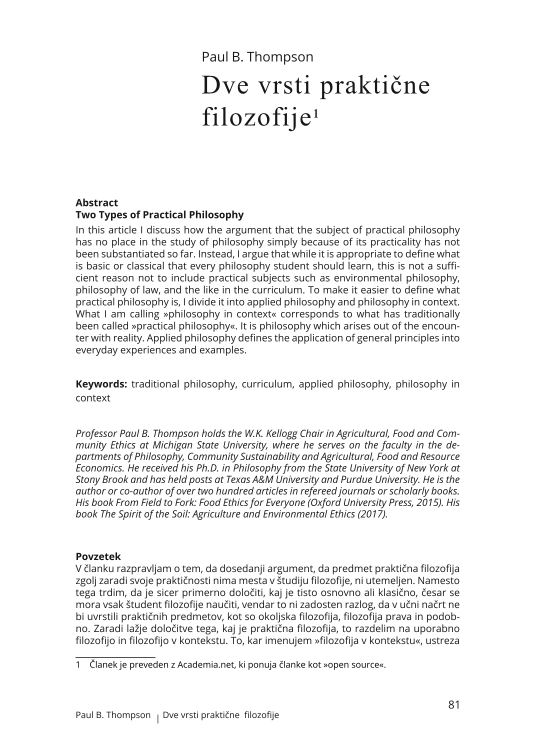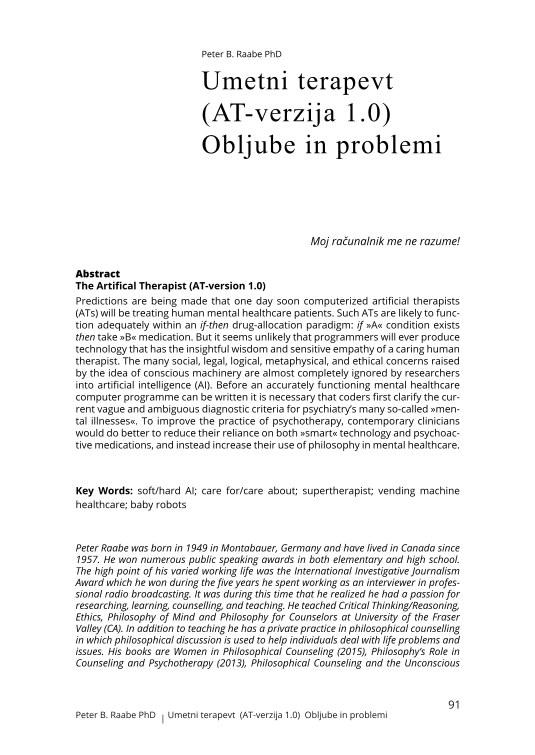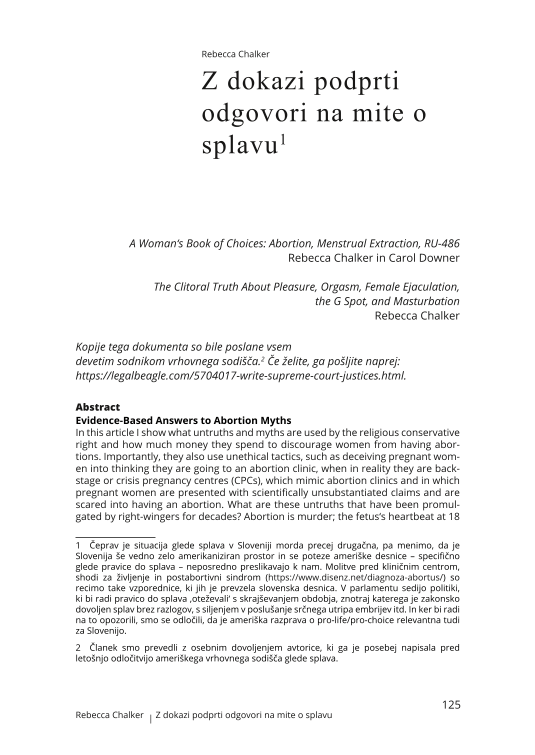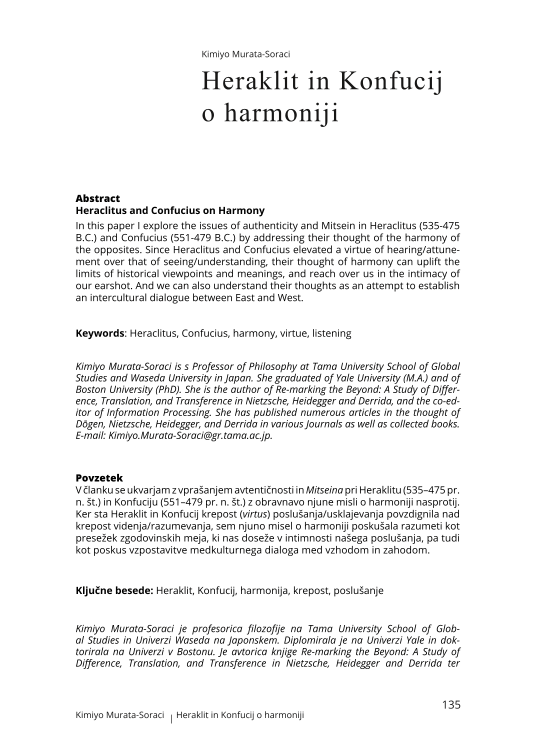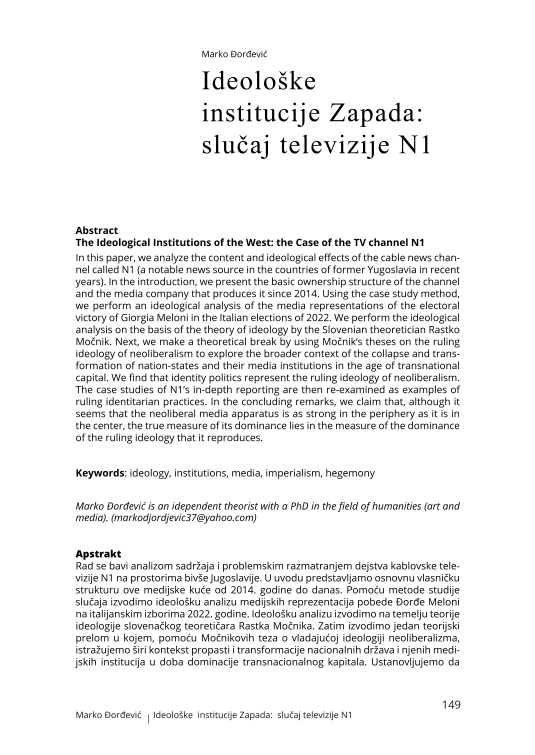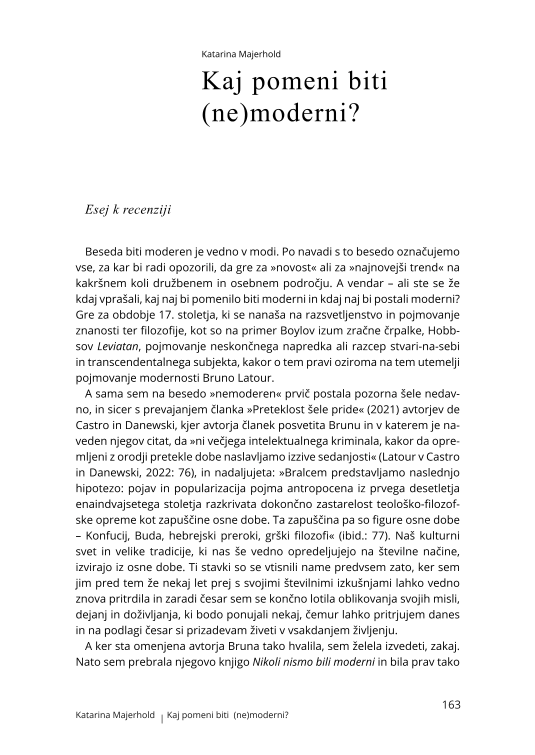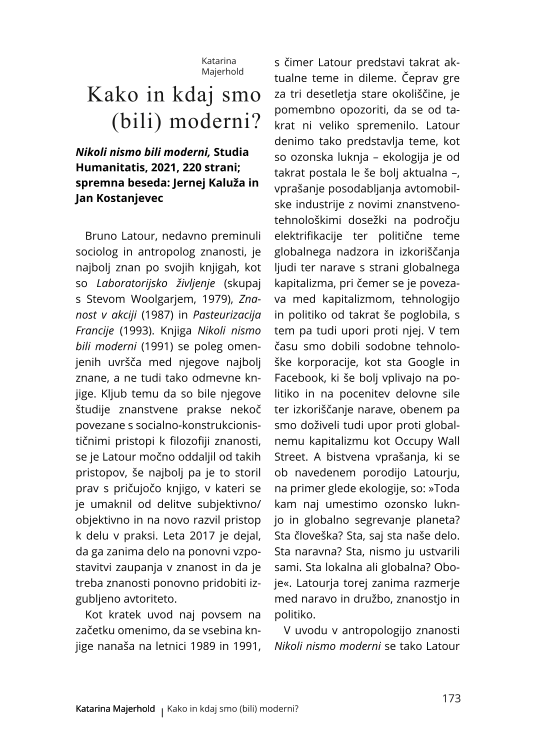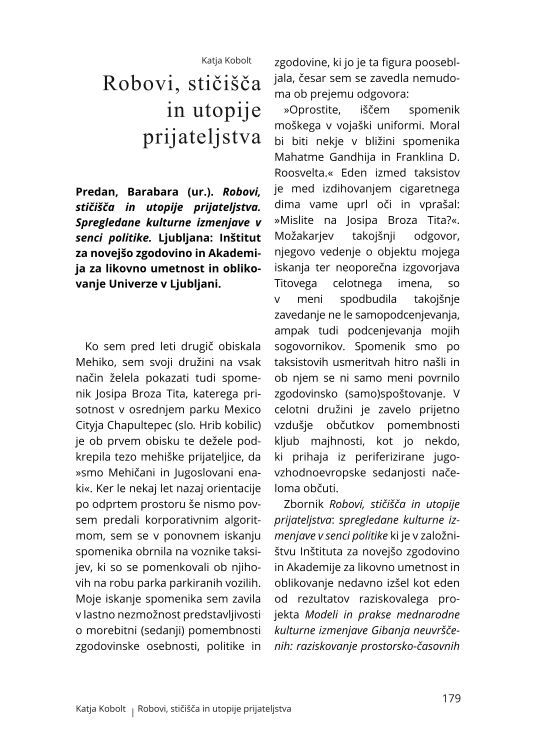Pogosto se srečujemo z vprašanji, če oziroma kako je filozofija (lahko) praktična. Pričujoči tematski sklop ponuja več odgovorov na ta vprašanja. Urednici, ki imata izkušnje s praktično filozofijo, sta se za tak tematski sklop odločili zaradi vsesplošnih koristi filozofskih praks, ki jih končna zbirka člankov opisuje in analizira.
Majerhold ima dolgoletne izkušnje na področju praktične filozofije, natančneje s področja filozofskega svetovanja. Leta 2006 se je začela ukvarjati z vprašanjem, kako bi lahko v današnjem času uporabila filozofijo v praktične namene, kajti razen nekaj možnosti za zaposlitev na fakulteti in kakšnem inštitutu ter učiteljevanja na srednjih šolah možnosti za zaposlitev s filozofsko izobrazbo ni bilo. Med iskanjem drugih možnosti je naletela na različne vire danes priznanih filozofskih svetovalcev.
Dali Regent je leta 2019 ustanovila prvo slovensko društvo za praktično filozofijo Hiša filozofije. Pred tem je kot prostovoljka za Društvo informacijski center Legebitra vodila krožek praktične filozofije – pilotno prizadevanje, ki se je izkazalo za enega najbolj priljubljenih in najbolje obiskanih rednih krožkov Legebitrinega mladinskega centra. Regent je v letih 2018–2021 izvedla več kot petdeset praktičnofilozofskih delavnic, poljudnih predavanj in intervjujev v okviru različnih projektov za več različnih organizacij. Skratka, obe imata vrsto izkušenj s področja praktične filozofije, kar je narekovalo izbor člankov in prevodov.
Philosophical counselling is a form of new practices of philosophy, which has established itself to such an extent that it has its own associations, professional journals and regular congresses. This does not mean, however, that a unified work model has been established. The article discusses two approaches that show the breadth of the field: the PEACE model developed by Lou Marinoff, and philosophical counselling as a practice of philosophizing, as developed by Stefano Zampieri. The analysis shows that the important difference between them is not in the answer to the question of method for philosophical counselling, but primarily in its conceptualization: is philosophical counselling a technique for solving the client’s life problems or a philosophical dialogue with the guest as a practice of freedom.
In this paper, we address the topic of practical philosophy. The basic purpose is, with the help of a concrete example of the analysis of Aristotle's practical philosophy, to show what Aristotle's understanding of practical philosophy was and how later, in the works of Machiavelli and Hobbes, this philosophy changed. We approach the topic in the way of hermeneutic analysis of Aristotle's works, followed by a comparative interpretation with Machiavelli's and Hobbes' works. Aristotle's practical philosophy, which, in a broader sense, covers the field of ethics and politics, is considered narrowed and focused on his more concrete understanding of (human) action (praxis). This step makes sense, since the name itself (practical philosophy) derives from the notion of praxis (action). In this narrowed and directed understanding of Aristotle's practical philosophy, we understand it as a philosophy of human actions. This approach allows us to elaborate Aristotle's understanding of (human) action, which forms the basis for understanding his philosophy of human actions and thus his practical philosophy. The basic conclusion of the paper is that we cannot speak of a single field of practical philosophy, but of different practical philosophies that differ from thinker to thinker. Each of these different practical philosophies is based on unique assumptions about human beings, ethics, politics, the goals of the political community and the like.
In the following article the occurrence of practical philosophy online is explored. With the help of authors such as Rancière, Kohan, and Freire, a set of possibly relevant pedagogical lessons that different manifestations of practical philosophy in new online media can offer has been extracted: the potential for emancipation and motivation, a possibility to explore, acknowledge, and address the existential and emotional distress of younger generations (»digital natives«), an opportunity to reexamine the established educational structures, as well as the potential to build niche communities that bring people together. As examples of good practice, two content creators that primarily work on the YouTube platform have been introduced: Natalie Wynn (ContraPoints) and Abigail Thorn (Philosophy Tube).
The Importance Of Philosophy For Children In The Formation Of Individual's Identity. The process of forming one's own identity in today's society brings about a variety of issues that many youngsters have to face. They can result in personal dilemmas, conflicts or violence. The article discusses the idea of constructing one's own identity without excluding or rejecting other individuals in today's (capitalist) society that is somehow defined by competiton and decisions made on the basis of artificially set standards. This is why the analysis focuses on discussing some reasons for a possible identity crisis. It also presents positive effects that practical philosophy can have on children when it comes to understanding and reflecting their own identity as well as other social relations. Consequently, they can understand their own path and what surrounds them better. One of the possible ways of encouraging children to find their inner peace and stability is learning about philosophy as well as practicing its ideas at a young age. This is why the optional school subject called Philosophy for Children could importantly contribute to children's way of experiencing life. The approach is based on the dimensions of one's curiosity (thaumazein) that affects the process of learning, understanding and reflecting individuals' decisions and experiences.
In this article I discuss how the argument that the subject of practical philosophy has no place in the study of philosophy simply because of its practicality has not been substantiated so far. Instead, I argue that while it is appropriate to define what is basic or classical that every philosophy student should learn, this is not a sufficient reason not to include practical subjects such as environmental philosophy, philosophy of law, and the like in the curriculum. To make it easier to define what practical philosophy is, I divide it into applied philosophy and philosophy in context. What I am calling »philosophy in context« corresponds to what has traditionally been called »practical philosophy«. It is philosophy which arises out of the encounter with reality. Applied philosophy defines the application of general principles into everyday experiences and examples.
Predictions are being made that one day soon computerized artificial therapists (ATs) will be treating human mental healthcare patients. Such ATs are likely to function adequately within an if-then drug-allocation paradigm: if »A« condition exists then take »B« medication. But it seems unlikely that programmers will ever produce technology that has the insightful wisdom and sensitive empathy of a caring human therapist. The many social, legal, logical, metaphysical, and ethical concerns raised by the idea of conscious machinery are almost completely ignored by researchers into artificial intelligence (AI). Before an accurately functioning mental healthcare computer programme can be written it is necessary that coders first clarify the current vague and ambiguous diagnostic criteria for psychiatry’s many so-called »mental illnesses«. To improve the practice of psychotherapy, contemporary clinicians would do better to reduce their reliance on both »smart« technology and psychoactive medications, and instead increase their use of philosophy in mental healthcare.
In this article I show what untruths and myths are used by the religious conservative right and how much money they spend to discourage women from having abortions. Importantly, they also use unethical tactics, such as deceiving pregnant women into thinking they are going to an abortion clinic, when in reality they are backstage or crisis pregnancy centres (CPCs), which mimic abortion clinics and in which pregnant women are presented with scientifically unsubstantiated claims and are scared into having an abortion. What are these untruths that have been promulgated by right-wingers for decades? Abortion is murder; the fetus‘s heartbeat at 18 days means it is a person; the fetus feels pain; abortion causes breast cancer; abortion is dangerous; abortion causes post-abortive syndrome; post-abortion trauma syndrome, the abortion repeal myth and crisis pregnancy centres (CKN) are copying abortion clinics.
In this paper I explore the issues of authenticity and Mitsein in Heraclitus (535-475 B.C.) and Confucius (551-479 B.C.) by addressing their thought of the harmony of the opposites. Since Heraclitus and Confucius elevated a virtue of hearing/attunement over that of seeing/understanding, their thought of harmony can uplift the limits of historical viewpoints and meanings, and reach over us in the intimacy of our earshot. And we can also understand their thoughts as an attempt to establish an intercultural dialogue between East and West.
In this paper, we analyze the content and ideological effects of the cable news channel called N1 (a notable news source in the countries of former Yugoslavia in recent years). In the introduction, we present the basic ownership structure of the channel and the media company that produces it since 2014. Using the case study method, we perform an ideological analysis of the media representations of the electoral victory of Giorgia Meloni in the Italian elections of 2022. We perform the ideological analysis on the basis of the theory of ideology by the Slovenian theoretician Rastko Močnik. Next, we make a theoretical break by using Močnik‘s theses on the ruling ideology of neoliberalism to explore the broader context of the collapse and transformation of nation-states and their media institutions in the age of transnational capital. We find that identity politics represent the ruling ideology of neoliberalism. The case studies of N1’s in-depth reporting are then re-examined as examples of ruling identitarian practices. In the concluding remarks, we claim that, although it seems that the neoliberal media apparatus is as strong in the periphery as it is in the center, the true measure of its dominance lies in the measure of the dominance of the ruling ideology that it reproduces.
Beseda biti moderen je vedno v modi. Po navadi s to besedo označujemo vse, za kar bi radi opozorili, da gre za »novost« ali za »najnovejši trend« na kakršnem koli družbenem in osebnem področju. A vendar – ali ste se že kdaj vprašali, kaj naj bi pomenilo biti moderni in kdaj naj bi postali moderni? Gre za obdobje 17. stoletja, ki se nanaša na razsvetljenstvo in pojmovanje znanosti ter filozofije, kot so na primer Boylov izum zračne črpalke, Hobbsov Leviatan, pojmovanje neskončnega napredka ali razcep stvari-na-sebi in transcendentalnega subjekta, kakor o tem pravi oziroma na tem utemelji pojmovanje modernosti Bruno Latour.
Nikoli nismo bili moderni, Studia Humanitatis, 2021, 220 strani; spremna beseda: Jernej Kaluža in Jan Kostanjevec
Bruno Latour, nedavno preminuli sociolog in antropolog znanosti, je najbolj znan po svojih knjigah, kot so Laboratorijsko življenje (skupaj s Stevom Woolgarjem, 1979), Znanost v akciji (1987) in Pasteurizacija Francije (1993). Knjiga Nikoli nismo bili moderni (1991) se poleg omenjenih uvršča med njegove najbolj znane, a ne tudi tako odmevne knjige. Kljub temu da so bile njegove študije znanstvene prakse nekoč povezane s socialno-konstrukcionističnimi pristopi k filozofiji znanosti, se je Latour močno oddaljil od takih pristopov, še najbolj pa je to storil prav s pričujočo knjigo, v kateri se je umaknil od delitve subjektivno/ objektivno in na novo razvil pristop k delu v praksi. Leta 2017 je dejal, da ga zanima delo na ponovni vzpostavitvi zaupanja v znanost in da je treba znanosti ponovno pridobiti izgubljeno avtoriteto.
Predan, Barabara (ur.). Robovi, stičišča in utopije prijateljstva. Spregledane kulturne izmenjave v senci politike. Ljubljana: Inštitut za novejšo zgodovino in Akademija za likovno umetnost in oblikovanje Univerze v Ljubljani.
Ko sem pred leti drugič obiskala Mehiko, sem svoji družini na vsak način želela pokazati tudi spomenik Josipa Broza Tita, katerega prisotnost v osrednjem parku Mexico Cityja Chapultepec (slo. Hrib kobilic) je ob prvem obisku te dežele podkrepila tezo mehiške prijateljice, da »smo Mehičani in Jugoslovani enaki«. Ker le nekaj let nazaj orientacije po odprtem prostoru še nismo povsem predali korporativnim algoritmom, sem se v ponovnem iskanju spomenika obrnila na voznike taksijev, ki so se pomenkovali ob njihovih na robu parka parkiranih vozilih. Moje iskanje spomenika sem zavila v lastno nezmožnost predstavljivosti o morebitni (sedanji) pomembnosti zgodovinske osebnosti, politike in zgodovine, ki jo je ta figura poosebljala, česar sem se zavedla nemudoma ob prejemu odgovora:




